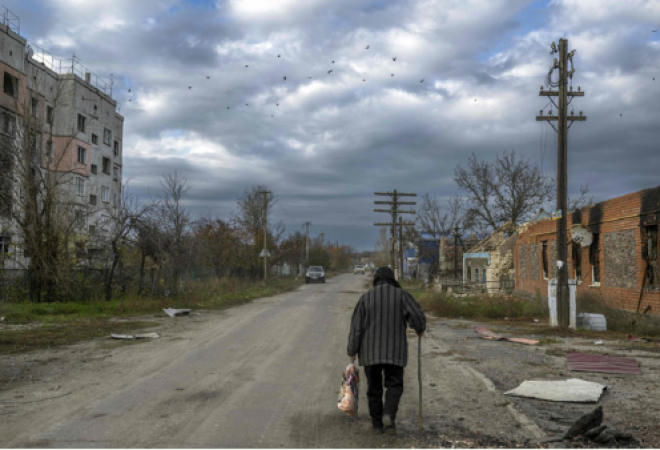
Kyiv: A historic church in the Ukrainian city of Kherson was damaged by Russian artillery on Thursday. The church previously housed the remains of Prince Grigory Potemkin, a military leader in the 18th century who encouraged Catherine the Great to extend the Russian Empire into what is now southern Ukraine.
Four of the emergency service's employees were hurt, according to Ukraine, as they battled a fire at St. Catherine's Cathedral during a second round of shelling. The first shelling attack, which also hit a trolleybus, injured four additional people, according to the prosecutor general's office.
A beloved Orthodox cathedral in Odesa, another city in southern Ukraine, was severely damaged by a missile strike, and Thursday's attack highlighted the danger the war poses to the nation's historical landmarks. As Ukraine's military steps up a counteroffensive to reclaim Russian-occupied territory, fighting has gotten worse in a number of areas.
Also Read: 18 people are killed when a bus carrying Indians crashes into a ravine in Mexico
One of the most famous structures in the city is the Kherson church, which was built in 1781. It served as Potemkin's final resting place. Potemkin was a favourite of Catherine the Great and was instrumental in bringing about the annexation of Crimea from the Crimean Khanate in 1784.
Potemkin was appointed governor general of "New Russia." His reputation spread due to the now widely discredited claims that he built fictitious communities known as "Potemkin villages" to impress Catherine on her arduous journey through the Crimea and the southern territories.
President Vladimir Putin made reference to the idea of New Russia in September at a Kremlin ceremony commemorating Russia's illegitimate annexation of four occupied or partially occupied provinces of Ukraine. He also mentioned that both Catherine the Great and Potemkin had founded cities there.
During the eight-month occupation of the city, authorities supported by Moscow had Potemkin's remains removed. In November, Russian troops left Kherson as Ukrainian troops advanced in their campaign to retake the areas Putin annexed.
Also Read: Escalating Tensions: Ukraine Strikes Russian Naval Base near Novorossiysk
The city became the target of daily Russian attacks after the Russian retreat, the majority of which involved artillery and drones launched from Russian-held territory across the Dnieper River. Reports of civilian casualties are frequently the result of the relentless strikes.
Two people were reportedly killed by Russian attacks over the course of the previous day, one each in the provinces of Zaporizhzhia and Donetsk in eastern Ukraine.
The Kyiv region was attacked by a wave of 15 Russian Shahed drones that explode upon impact, according to the Ukrainian air force, but all were shot down. There were no injuries or property damage, according to Ruslan Kravchenko, the governor of the capital region.
At least 1,961 Shahed drones have been launched by Russia, according to Ukraine's President Volodymyr Zelensky, who also noted that "a significant number of them have been shot down."
In a nightly video address to the country, he stated, "Unfortunately, not all of them," adding that Ukraine has been requesting more air defence weapons from its Western allies. "We are attempting to shoot down more targets, ideally as many as we can. We are attempting to increase our air defence system count.
The military of Ukraine has continued to send attack drones deep into Russian territory. The latest incident, which came after attacks that twice hit buildings in the Russian capital that house some government ministries, was the downing of seven Ukrainian drones in the Kaluga region, about 150 kilometres (90 miles) south of Moscow, according to the Russian Defence Ministry.
Later on Thursday, another drone was shot down, according to Kaluga Governor Vladislav Shapsha.
Also Read: West African bloc searches for a solution to the Niger coup as the deadline approaches
Since January 1, 231,000 men have enlisted in the Russian army as contract soldiers, according to Dmitry Medvedev, the deputy chair of Russia's Security Council. Just a few months after the Russian government launched a significant campaign to persuade more men to sign military contracts, Medvedev made the comments at a meeting on building up the army.
Moscow wants to increase the number of troops in Ukraine and increase the size of its army to 1.5 million. In December, Sergei Shoigu, Russia's defence minister, stated that the nation required that many soldiers "to fulfil tasks to ensure Russia's security."